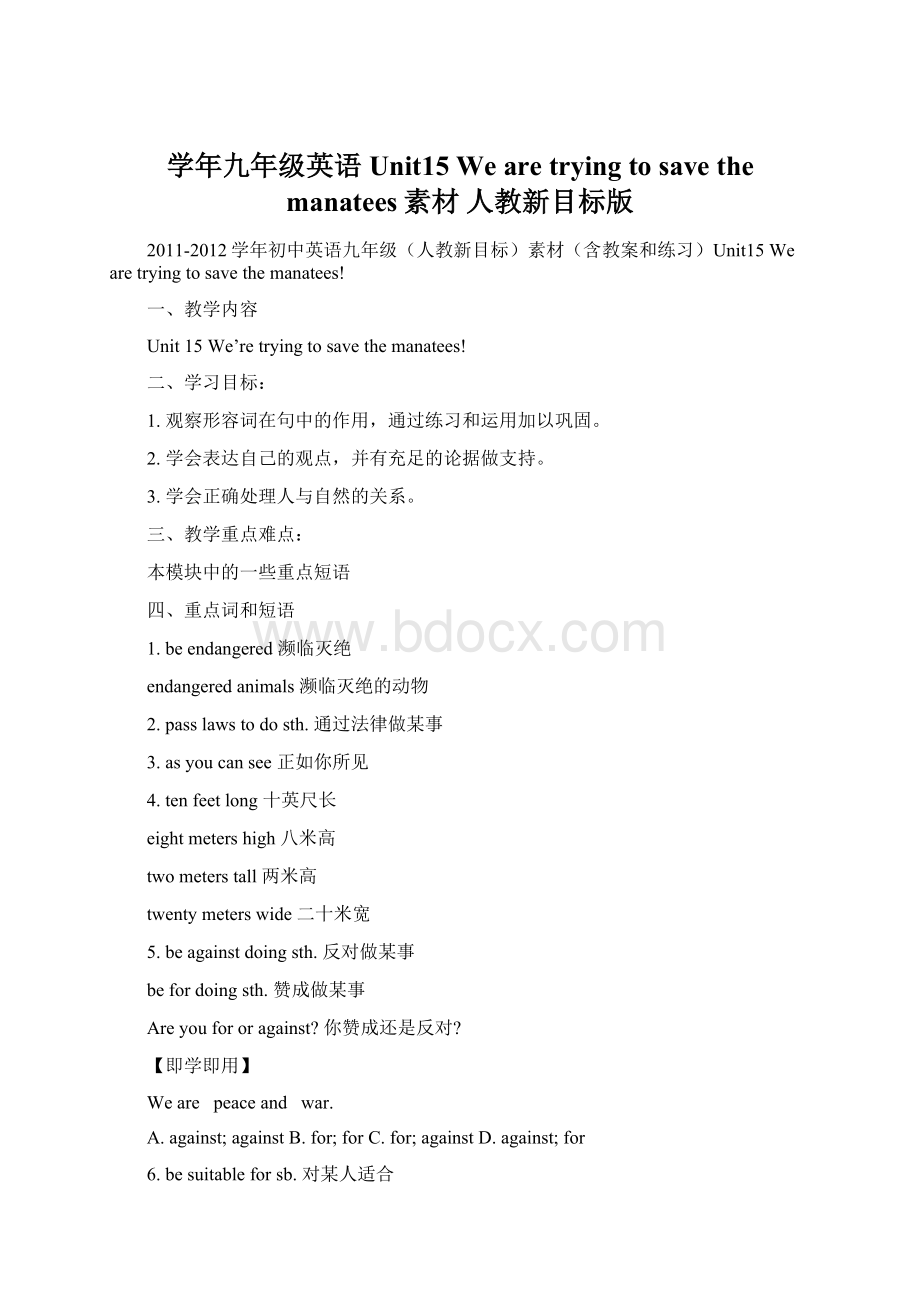学年九年级英语 Unit15 We are trying to save the manatees素材 人教新目标版Word格式.docx
《学年九年级英语 Unit15 We are trying to save the manatees素材 人教新目标版Word格式.docx》由会员分享,可在线阅读,更多相关《学年九年级英语 Unit15 We are trying to save the manatees素材 人教新目标版Word格式.docx(16页珍藏版)》请在冰豆网上搜索。

againstD.against;
for
6.besuitableforsb.对某人适合
7.besurprisedtodosth.惊奇做某事
besurprisedat…吃惊于……
toone’ssurprise使某人吃惊的是
8.livingtextbook活生生的教材
9.providesth.forsb.为某人提供某物
Lastmonth,theymuchmoneythepoorpeople.
A.provide;
forB.provide;
withC.provided;
forD.provided;
with
10.carefor关怀
takegoodcareofsb.照顾好某人
lookaftersb.well
careforsb.well
11.urgesb.todosth.强烈要求某人做某事
Theteacherurgeshisstudentsontimewhentheydoeverything.
A.areB.beingC.tobeD.be
12.weigh100pounds重100磅
loseone’sweight减肥
13.averageperson普通人
14.takeone’sownbag带某人自己的包
15.livecloseto住得离……很近
closethedoor关门
Thedoorisclosed.门是关着的
beclosedtosb.与某人亲密
comeveryclose来得紧迫
16.hearof听说
17.bebuiltoutofsth.由……制造
18.beaninspirationtosb.对某人是一个灵感
19.inone’sspare/freetime在某人空闲时间
20.Heisthemostcarefulstudentintheclass.他是班上最认真的学生。
Sheisamost/veryunusualwoman.她是一个非常不寻常的女士。
五、重点、难点、考点及疑点注释
1....andhelptoeducatethepublicaboutcaringforthem.……并且帮助教育公众关爱它们。
(SectionA,3b)
carefor表示“喜欢”,“关心”之意,后接名词或v-ing形式作宾语,takecareof也有这个意思。
Hecarednothingforskating.他对滑冰没有兴趣。
Inourclass,wecareforeachother.在我们班上,我们相互关心。
Mariatakesgoodcareofeverybody.玛丽亚很关心大家。
【友情链接】carefor还可以表示“照顾”,“照料”,相当于takecareof或lookafter。
Atnighthefedandcaredforthecattle.夜里他照料牲口,给牲口喂食。
Youmustcareforyourselves.
=Youmustlookafteryourselves.
你们要照顾好自己。
Thechildrenarewellcaredforinthenurseries.
=Thechildrenaretakengoodcareofinthenurseries.
孩子们在托儿所受到很好的照顾。
2.YouhaveprobablyneverheardofAmyWinterbourne.你可能从来没有听说过AmyWinterbourne。
(SectionB,3a)
【知识归纳】hear,hearfrom,hearof与hearthat从句的用法:
(1)hear单独使用表示“听见”,“听到”,常用的结构有:
◎hearsb./sth.听到某人或某物的声音
Ican’thearyouatall.我根本就听不到你的声音。
Haven’tyouheardanything?
难道你没有听到什么声音?
◎hearsb.dosth.“听到某人做某事”。
IoftenhearLiPingreadEnglishinthemorning.
我经常在早晨听到李平读英语。
◎hearsb.doingsth.“听到某人正在做某事”。
Iheardhimsinginginthenextroom.我听见他正在隔壁房间里唱歌。
特别提示:
hearsb.dosth.指听到整个行动或整个事件;
而hearsb.doingsth.是指听到了行动的一部分,有正在发生的意思。
试比较:
Iheardtheboygodownthestairs.我听到这个男孩走下楼去。
Iheardtheboygoingdownthestairs.我听到这个男孩下楼的声音。
(2)hearfrom意为“收到……的信”;
“得到……消息”。
Howoftendoyouhearfromyourfather?
你每隔多久收到你父亲的信?
Haveyoustillnotheardfromhim?
你还没有收到他的信吗?
Ihaven’theardfromhimsincehetelephoned.
自从他打电话以来,我一直没有他的消息。
hearfrom的宾语是表示人的名词或代词,而不是表示信件的名词。
魔力纠错:
我们好几个星期未收到他的信了。
误:
Wehaven’theardfromhisletterforweeks.
正:
Wehaven’theardfromhimforweeks.
Wehaven’tgotaletterfromhimforweeks.
(3)hearof意为“听说”,后面接名词,代词或动名词。
I’veneverheardofthatbefore.我以前从未听说过那件事。
Shedisappearedandwasneverheardofagain.
她不知去向了,再未听到她的消息。
(4)hear接从句,是“听说”的意思。
Oneday,theSmithsheardthattherewasagooddoctorinatownnotfaraway.
一天,史密斯一家听说不远的镇里有一位好医生。
Ihearthatoneofthepandashasababy.
我听说其中一只熊猫生了个熊猫宝宝。
3.Sheisamostunusualwoman.她是一个十分不寻常的女性。
【知识归纳】amost,themost的用法
(1)amost的用法。
在“amost+形容词+名词”结构中,most是副词,意为“很,非常”,相当于very,用来修饰它后面的形容词,本句就是这一用法。
Guilinisamostbeautifulcity.桂林是座非常美丽的城市。
Thisisamostinterestingstory.这是一个非常有趣的故事。
(2)themost的用法
◎在“themost+形容词+名词”结构中,most是副词,表示程度,意为“最”,与其后的形容词一起构成形容词的最高级。
HeisoneofthemostfamouswritersinChina.他是中国最著名的作家之一。
Thisisthemostdifficult(one)ofthethree.这是这三者中最难的。
4.Thewallsaremadefromoldglassbottlesthataregluedtogether.墙是由旧玻璃瓶粘在一起建成的。
bemadefrom/of意为“由……(原料)制成”,后面一般接物质名词。
接from则表示某物品制成后,已看不出原材料是什么,原材料在制作过程中已起了化学变化;
接of表示某物品制成后,仍可看得出原材料,其原料在制作过程中仅起了物理变化。
Nylonismadefromair,coalandwater.尼龙是由空气,煤和水加工制成的。
Wineismadefromgrapes.葡萄酒是由葡萄制成的。
Thedeskismadeofwood.这桌子是由木头做的。
Theshoesaremadeofcloth.这鞋子是用布做的。
知识拓展:
◎bemadeupof表示某物或某组织由一种种成分或一个个成员组成。
Theworldismadeupofmatter.世界是由物质构成的。
ATVsetismadeupofhundredsofdifferentparts.
电视机是由数百个不同的零件组装成的。
◎bemadeinto意为“把……做成……”,主语在意义上为原材料,介词宾语在意义上为制成品。
Bambooisalsomadeintopaper.竹子也可以用来造纸。
◎bemadein意思是“在……(地点)制造”,介词in后接产地。
ThiskindofcomputerismadeintheUSA.这种电脑是美国制造的。
ThisprintingmachinewasmadeinBeijing.这台印刷机是北京生产的。
◎bemadeby意思是“由……制造”,介词by后跟动作的执行者。
ThismodelshipismadebyUncleWang.这个轮船模型是由王叔叔制作的。
bemadeof,bemadefrom,bemadein,bemadeinto,bemadeupof填空:
Bookspaperandpaperwood.
Thiskindofwinewheat.
thesecomputersJapan?
Grapescanwine.
Thisteamnineplayers.
5.AmyrecentlywonanawardfromtheHelpSaveOurPlanetSociety.艾米最近获得了“救助地球”协会的奖励。
(1)recently表示“最近”,多用于完成时态。
HaveyouheardfromMichaelrecently?
你最近接到迈克尔的来信吗?
Recentlyhehasmadequiteafewmistakes.最近他出了不少错。
(2)wonanaward中award是“奖”的意思,相关词语有prize,reward和scholarship,这几个词都与“奖”有关。
(3)句中的win表示“赢”奖的意思。
Atthenationalamateursong-writingcontest,hewonafirst-classaward.
在全国业余作曲比赛中,他获得了一等奖。
win可表示“赢得比赛,战斗”等,宾语一般是比赛,竞赛,战争等名词,与beat近义。
win与beat的用法
两者在表示“赢”,“胜”的意思时,后面所接的宾语有所不同。
“赢比赛或一场战斗”用win;
“赢某人”是beat。
Wewonthematchmonthsago.几个月前,我们赢得那场比赛。
Whichsidewonthebattle?
这一战谁打胜了?
Butstillweweren’tsurewecouldbeatthem.
但是我们还不能肯定我们能打赢他们。
DickbeatJohnandwonthegame.狄克打败了约翰,赢得了比赛。
六、语法:
“动词不定式”全搜索
动词不定式的基本形式是“to+动词原形”,有时可以不带to。
在句子中作主语、宾语、表语、宾语补足语、定语和状语。
动词不定式没有人称和数的变化,在句子中不能作谓语。
1.作主语
动词不定式作主语时,常用作形式主语放在主语的位置,而将动词不定式(短语)放到句尾。
如:
It’sagoodhabittohavebreakfasteveryday.每天吃早饭是个好习惯。
It’seasytogetlostinabigcitylikeTokyo.在东京这样的大城市容易迷路。
2.作表语
动词不定式放在系动词后面作表语,通常说明主语的内容或性质。
Yourtaskistocleanyourclassroom.你的任务就是打扫教室。
Theoldman’sjobistotakecareoftheflowersinthegarden.
这位老人的工作是照料花园里的花。
3.作宾语
动词不定式常用在agree,decide,hope,learn,offer,plan,prefer,pretend,refuse,want,wish等及物动词后作宾语。
IwanttoknowwhatIshoulddonext.我想知道我下一步做什么。
Idecidedtotakethechance.我决定抓住这次机会。
有的动词不定式作宾语,且在后面有宾语补足语时,常用it作形式宾语。
常用句型:
think/consider/find+it+adj.+todosth.如:
IfinditnecessarytotalktoTomonceagain.我觉得再和汤姆谈一次很有必要。
4.作宾语补足语
①动词不定式在ask,allow,advise,expect,remind,tell,urge,want,wish等及物动词后作宾语补足语。
Iexpectyoutogivemesomehelp.我盼望你给些帮助。
②动词不定式在“一感觉feel;
二听listento,hear;
三使let,make,have;
四看watch,see,lookat,notice”等词后作宾语补足语时,通常省略to。
Isawyourmomgointotheshop.我看见你妈妈进了商店。
5.作定语
动词不定式作定语时,要放在所修饰的名词或代词后。
如果动词不定式中的动词是不及物动词,则该动词不定式须加上相应的介词。
NewYorkisagoodplacetovisit.纽约是个游览的好地方。
Thereisnothingtoworryabout.没有什么可担忧的。
6.作状语
①表目的
Tocatchtheearlybus,Igotupearlythismorning.
为了赶上早班车,我今天早早就起床了。
②表结果
动词不定式作状语表示结果时常与too或enough连用。
Theboxistooheavytocarry.这个箱子太重了搬不动。
Thereisenoughtimetocatchthetrain.有足够的时间赶上这班火车。
7.动词不定式与疑问词连用
动词不定式与疑问词who,which,when,how,what等连用,在句中起名词的作用,可充当主语、宾语、表语等。
Howtosolvetheproblemisveryimportant.如何解决这个问题很重要。
(作主语)
Mr.Greendidn’tknowwhattosay.格林先生不知道该说什么。
(作宾语)
Myquestioniswhentostart.我的问题是什么时候开始。
(作表语)
“动词不定式”2007中考真题
1.It’shardajob.(山东青岛)
A.tolookforB.tofindC.tofindoutD.tolookat
2.Mum,I’mhungry.
WhataboutgoingtoKFChamburgers?
(山东聊城)
A.eatB.toeatC.eatingD.andeat
3.Ourparentsoftentellusnotaloneintheriverinsummer.(湖南长沙)
A.swimB.toswimC.swimming
4.IwonderedwhatIshoulddonext.(改为简单句)
Iwonderedwhatnext.(内蒙古乌兰察布)
参考答案:
1~3BBB4.todo
中考聚焦:
“时态与语态”2007中考真题
1.—Where’syourmother,Helen?
—Shetheflowersinthegarden.(江苏镇江)
A.watersB.wateredC.iswateringD.haswatered
2.Simonhisfingerswhenhewascookingthedinner.(江苏盐城)
A.burntB.wasburningC.hasburntD.hadburnt
3.—Doyouknowwhattheword“cool”means?
—Ofcourse.Itbyyoungpeoplesooftentheseyears.(浙江绍兴)
A.usesB.isusedC.wasusedD.isusing
4.—It’sraining!
Whendiditstart?
—Idon’tknowexactly.Infact,itallthisafternoon.(北京)
A.lastsB.haslastedC.lastedD.willlast
5.—DidyouhearthatwaterinTaiLakesmeltterrible?
—Yes.Infact,it.That’sallbecauseofthepeopleandthefactoriesaround.(湖北黄冈)
A.pollutedB.waspollutedC.haspollutedD.willpollute
1~5CABBB
【模拟试题】
(答题时间:
70分钟)
Ⅰ.单项选择
1.Thisplaceissuitablewildanimalstolivein.
A.toB.atC.forD.with
2.—Somepeoplethinkthatanimalsshouldnotliveinzoos.
—Iagreethem.
A.aboutB.ofC.withD.to
3.—Doyoulikepolarbears,Anna?
—Oh,no.Theyarevery.
A.gentleB.fastC.aggressiveD.endangered
4.CollectingandsellingusedthingsisagoodwaytomoneyfortheChildren’sHospital.
A.askB.raiseC.findD.make
5.—Haveyoueverseenthisfamouswriter?
—No.I’vejusther.
A.listenedB.listenedtoC.heardD.heardof
﹡6.—Icouldn’tbelieveIsawinthiscountry.
A.thatB.whereC.whatD.which
7.—Doctor,itseemsthatyouliketoworkwithanimals.
—Yes,Ithinkanimalshouldasourfriends.
A.regardB.beregardedC.regardedD.isregarded
﹡8.Whatabigdog!
Pleasetellmehowmanypounds.
A.itweighsB.doesitweighC.weighsitD.toweighit
﹡9.—Presi